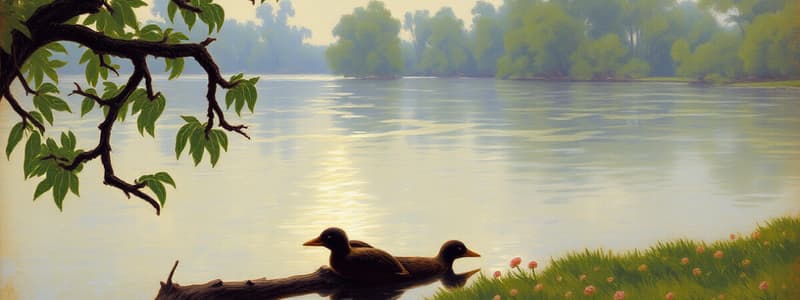Podcast
Questions and Answers
The Romantic Era is characterized by a significant emphasis on which theme?
The Romantic Era is characterized by a significant emphasis on which theme?
- Industrial growth
- Rational thought
- Heroic tales
- Emotion and nature (correct)
What major genre emerged during the Neo-Classical Era that reflects social and political issues?
What major genre emerged during the Neo-Classical Era that reflects social and political issues?
- Gothic Fiction
- Tragedy
- Satire (correct)
- Allegory
Which literary era is known for the use of epic poetry and heavily influenced by oral tradition?
Which literary era is known for the use of epic poetry and heavily influenced by oral tradition?
- The Anglo-Saxon Era (correct)
- The Renaissance Era
- The Victorian Era
- The Middle English Era
What major form of literature developed significantly during the Victorian Era?
What major form of literature developed significantly during the Victorian Era?
Which era is known for experimentation with narrative style, such as stream of consciousness?
Which era is known for experimentation with narrative style, such as stream of consciousness?
What genre was revived during the Renaissance Era?
What genre was revived during the Renaissance Era?
Which of the following was NOT a major genre associated with the Middle English Era?
Which of the following was NOT a major genre associated with the Middle English Era?
What is a defining characteristic of the Post-modern Era in literature?
What is a defining characteristic of the Post-modern Era in literature?
During which literary era did the transition from Old English to Middle English occur?
During which literary era did the transition from Old English to Middle English occur?
Which genre was NOT typically featured during the Romantic Era?
Which genre was NOT typically featured during the Romantic Era?
Flashcards are hidden until you start studying
Study Notes
History of English Literature
-
Anglo-Saxon Era (450-1066):
- Key genres include Epic Poetry, Riddles, and Religious Texts.
- The era is marked by Old English language shaped by oral traditions, emphasizing heroism, bravery, and faith.
-
Middle English Era (1066-1500):
- Involves genres such as Allegory and Morality Plays.
- Notable for the transition from Old English to Middle English, reflecting social and religious themes prevalent at the time.
-
Renaissance Era (1500-1660):
- Major genres included Drama, Poetry, and Prose.
- Highlights the revival of classical learning, the focus on humanism, and significant advancements in dramatic and poetic forms.
-
Neo-Classical Era (1660-1785):
- Features genres like Satire, Essays, and Poetry.
- Emphasizes reason, order, and logic, addressing contemporary social and political issues.
-
Romantic Era (1798-1832):
- Distinguished by genres such as Poetry, Gothic Fiction, and Novels.
- Reacts to the Industrial Revolution with an emphasis on emotion, nature, and individualism.
-
Victorian Era (1832-1901):
- Encompasses Novels, Poetry, and Short Stories.
- Focused on social issues, moral dilemmas, and individual struggles, with significant developments in novel writing.
-
Modern Era (1901-1939):
- Known for Novels, Poetry, and Drama.
- Characterized by experimental narrative styles such as stream of consciousness and fragmented structures.
-
Post-modern Era (1930-present):
- Encompasses Novels and Poetry with traits of irony, playfulness, and metafiction.
- Challenges traditional narrative forms and structures, exploring new ways of storytelling.
Studying That Suits You
Use AI to generate personalized quizzes and flashcards to suit your learning preferences.




